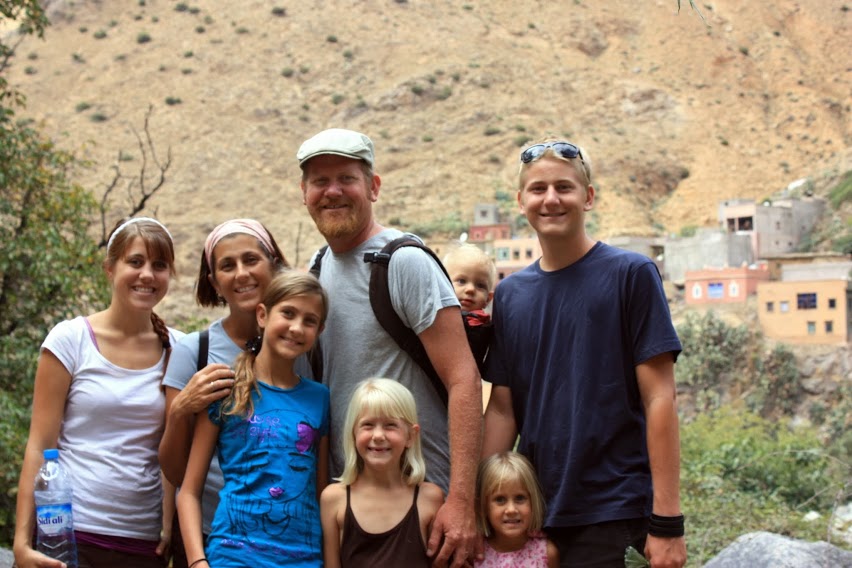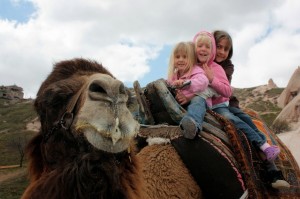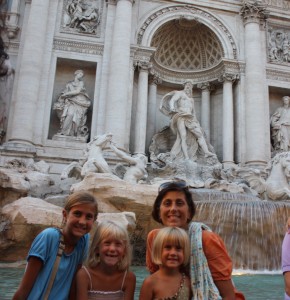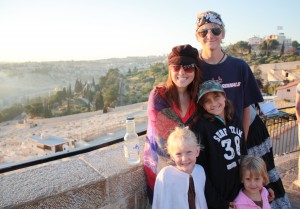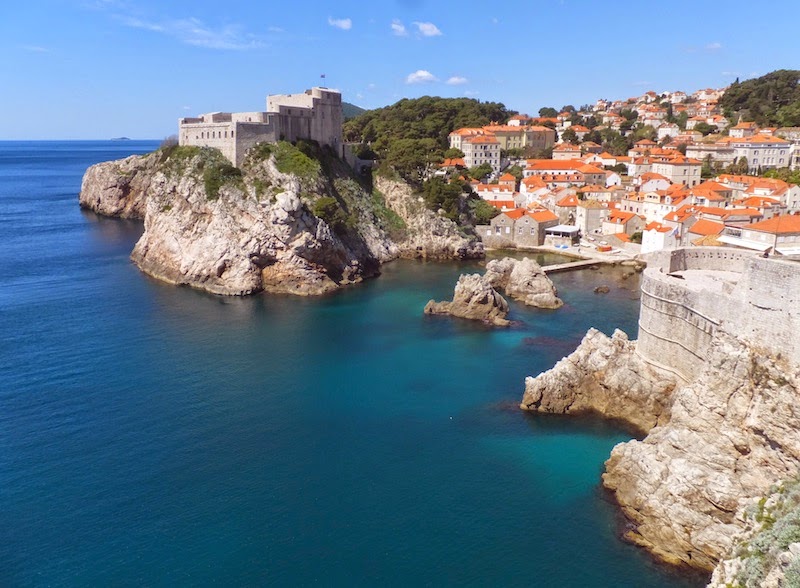Last week, I had the honor of being interviewed by “Suitcases & Strollers” a travel blog aimed at helping parents hit the road with kids. Aimee sent over a list of questions, and while I thought it was going to be easy, some of the questions had me scratching my head!
I thought it would be useful to post here as well so, read, apply, rinse, repeat! :)
1.The names and ages of your kids?
Our kids are: Maggie, 20; Levi, 19; Emma, 14; Lily, 10; Zoe, 8; and Miles, 4
2. How long have you been travelling on the road?
We left the US for a total of 5 years, lived in Costa Rica for 16 months, and from there, bought a sailboat in Greece and lived on the boat for 3+ years. We left in early Spring of 2008 and returned in November, 2012
3. What inspired you to quit your day job and take you entire family on the road? What did you want to achieve out of this?
We were burned out of the ‘status quo;’ acquiring more and more, and for what?! We wanted more quality time from the few years we get to spend with our kids. We were on the treadmill, and felt like life was being lived for us, we knew we wanted something more, but couldn’t really put our finger on it.
We had loved to travel before kids, and the thought of traveling with our kids seemed like a great ‘sabbatical’, to recharge our batteries, and connect with our kids.
We looked at it as an investment into our family, and we knew it was going to pay dividends in a lot of ways that have nothing to do with money. Confident kids who could communicate well, kids who were friends with their siblings, not just roommates, and kids who have a deep sense of security in who they are, and what they’ve accompished.
I will say, once we had it in our mind to make this trip happen, there came a point where we knew if we didn’t take the trip, we were going to have regrets. That was the point of no return for us, we just knew we had to make it happen.
4. How many countries has your family been to since you started traveling?
We visited a total of 27 countries, throughout Central America, the Mediterranean, and the Caribbean.
5. When did you start Family Adventure Podcast?
We launched the podcast in January of 2014, to inspire others to grab life with both hands and create epic experiences as a family!
6. How many families have you interviewed since you started the site?
We’ve been honored to meet some amazing families through the podcast. We’ve interviewed over 60 families, and released 54 episodes…..more to come!
7. What is the most common reason people cite for deciding to become permanent travelers? What inspires them to choose a nomadic lifestyle and travel with kids?
I think people are wanting more out of all of their relationships. People crave a genuine connection with their kids, and travel provides an amazing platform to do that. Fewer distractions, and the inevitable challenges on the road provide a great opportunity to connect, solve issues, and overcome obstacles. With our electronic world, it sometimes feels like we’re missing the connections closest to us, and I think that’s a motivating factor as well. All the amazing, once-in-a-lifetime sights are not a bad bonus, either!
Many of the families we interview, usually had some travel experience before children, and thought their traveling days were over until the kids at least reached college. When they see others doing it, they think, ‘why not? why wait?’ Which is exactly the message we want to get out, You can do it, and probably sooner than later!
In some cases, there had been an illness or even a death of a loved one or relative. It brings home the reality of this gift of life we’ve all been given. Life IS short, and there are no guarantees about tomorrow. If it’s something you’re passionate about, you should make plans to live without regrets!
8. How committed do you have to be to do this? Can you take a sabbatical, rent out your home and try it out for a year or do most people quit their jobs and sell their houses? What is the most common and practical way to start?
I think that’s the most overwhelming for families who are thinking about traveling for more than just a vacation….we have to ‘sell our souls’ this this mission. Not true! I see people do it all sorts of creative ways to get on the road! You don’t necessarily have to sell your house, although for many that is their biggest source of money for the trip.
Some quit their jobs, feeling it was time for change anyway, they negotiate a specific time off their jobs, knowing they will have something to go back to.
That’s one thing I’ve learned through the interviews: there’s no ‘right’ way to family travel. Every situation is different, and you need to do what you’re comfortable with.
The best way to start is taking small steps. Family travel is not necessarily for everyone, so see how it fits your family before you sell the farm. Take some small trips around your state, or region, and see how it feels. Stay in a hostel next time you are on the road, rent an air bnb, experiment with different ideas. Load up on books from the library for inspiration, put maps on the wall and talk about what you want to see as a family.
We talked to our kids a lot about the trip during the planning months and years, and really tried to explain to them WHY we felt like we needed to do this, what our motivations were, and the heart behind it. We wanted the trip to impact them, and our family as a whole.
9. How do permanent travellers support themselves? Where and how do they earn money? Are there certain occupations that make it easier to transition into a permanent travelling lifestyle? Why?
Certainly some careers lend themselves more readily to traveling than others. All you hear today is ‘location independent’ and acquiring a ‘digital career’. While these are great, they are not necessarily for everyone or mandatory. Not everyone is savvy enough to build a business online, and that’s OK!
There are hundreds of ways to build passive income or gain skills to take with you on the road. Personally, we use real estate, in the form of rental properties, some people use savings, so they don’t have to work from the road. Others, acquire skills that are easily adaptable to travel: nursing, teaching English. Some families pause while they work and re-fill the savings with their career as a gourmet chef. Some as German translators for a New Zealand University!
10. What is the optimal age to take kids permanently travelling? For instance, do babies fare better than teenagers? What are the most common experiences parents tell you about this?
If you’re interested in long term traveling, the teenage years get dangerously close to the transition to adulthood. They are less likely to be on board with extended traveling, missing friends, jobs, etc.
Babies are surprisingly great travelers, as we and many of our guests relate. They thrive when surrounded by parents 24/7 and are typically very flexible. That’s usually a shock to our guests, and it was for us as well. I think that’s another reason why families might choose to delay travel; they have young ones and don’t think it’s possible.
One of the best things I’ve found with traveling with young children, or even babies, is that you are SO welcomed everywhere you go. Families traveling are just natural magnets, and we have been shocked at the openness we felt with kids.
In the end, it’s a personal choice, and even if the kids aren’t ‘school-age’ they are learning and soaking up more of the experience than you may realize.
11. What is the best way to handle schooling if you are a permanent traveller? Do you have to be a teacher to home school or are there other options?
This has been amazing to see through the interviews. Permanent traveling itself is a form of school and a lot of our guests insist it is the best kind of school because it is so immersive and authentic! You don’t read about places, and people. You visit them!
So many families are concerned before they leave that they will do damage their kids’ education by traveling since they won’t be in a “normal” school, but they are all pleasantly surprised when they return to school and find that the kids are typically ahead of their peers, not to mention the mountain of experiences they are now privileged to have.
With the increased popularity of homeschooling, there is a plethora of resources available, great for travel, and not requiring a lot of expense or expertise.
A simplified travel education recipe?
-
Take 2 math books (at their level and above)
-
Fill a Kindle with a variety of reading (new, classic, fun)
-
Have the kids keep a journal (or draw if they’re young) of things they see and like.
-
Enjoy! These will be your most enjoyable school years, I promise!
12. Realistically, what is the impact of a nomadic lifestyle on kids? Are there negative results in terms of being unsettled or having difficulty in integrating into an environment? Are there any common concerns or issues you see in this area among the families you interview?
I try and ask all of my guests about negative impacts, because I think that’s what many parents fear before they travel. We tend to let our fears paint us a worst-case-scenario. Thankfully, almost all these fears are unfounded, and we have yet to hear of major negative results from family travel. There are of course the usual travel inconveniences: missed flights, lost luggage, but typically these make for the best stories later.
My experience is that kids really thrive with nomadic travel, they typically become much more confident, and independent. That seems to be one of the added bonuses of travel as a family, you’re all on the same level, dealing with unknown surroundings and experiences, you get to work as a team to adapt and figure out your surroundings.
Some families are concerned about social opportunities before they travel, and I think they find that kids tend to make friends wherever they go, even if they can’t speak the same language.
13. What are the three biggest disadvantages for families choosing to be permanent travellers versus living a more conventional lifestyle in one spot?
I’m not sure how to sort it into 3 distinct disadvantages, but there’s typically the aspect of missing extended family, and community. I think it comes back to life choices. There are tradeoffs with everything we choose to focus on. Every family needs to weigh the pros and cons for themselves, and make the decision.
I don’t hear from families that they wished they would not have traveled so they could have worked more, or earned more money. I typically hear that once they discover how enjoyable, less expensive, and beneficial for their family world travel is, they wish they would have done it sooner.
14. Is there a common theme in terms of the destination that permanent travellers choose to frequent? Are some parts of the world more popular than others? Why?
Europe seems to be very popular, because it’s first world status, and immense amount of history in fairly close quarters, but the tradeoff there is it one of the most expensive places to travel. We’ve a few families on the show who sent RV’s over from the US for a year or more, to cut down on hotel and restaurant expenses, which is a great way to see Europe.
South East Asia is another zone that seems to see a lot of families, a lot of diverse countries in a relatively dense area.
Our experience was on a sailboat, which is a great way to travel, sleep and eat relatively inexpensively. We sailed across the Atlantic, so there was $10,000 in airfare we didn’t pay for.
15. Is there a common demographic you see in permanent travelling families? Do they come from the same kinds of socio economic groups, particular nationalities or particular parts of the world? What does a typical travelling family look like?
They are a pretty diverse lot! College professors, professional people, construction workers, school teachers, or truck drivers! There does seem to be a thread with what types of people are either drawn to travel or thrive in it. They have a healthy outlook on life, very flexible, willing to take risks.
What is the general reaction of other people to permanent travellers? Are people envious and understanding or judgemental and negative? What are the most common reactions and how do families handle them?
I think most people are supportive. We met so many wonderful people on our travels, who were so encouraging about the benefits we were giving our kids, the education, and the experience. Some people we knew before we left were jealous, some negative, but that’s OK. You’ll always have that. For us, it was a good litmus test of who our real friends were.
For handling it, I think being confident in your decision, and communicating the why behind your decision, not necessarily defending it.
Are there any places people can get information if they are thinking about becoming a permanent travelling family? Which ones are good and why?
The internet is a treasure chest of information! I really like sites that give a lot of information, not only inspiration. If readers are interested, they should have a listen to our archives for first hand interviews with families out there doing it, and hear their advice.
What are the top 3 things readers should do if they are considering being a permanent travelling family? Why?
-
Communicate – Talk about why you want to travel, what do you hope to gain from the experience? Just stamps in your passport? Talk about where you want to visit. Why? Talk about how it’s going to change your outlook, what it’s going to be like to be away from extended family. I promise you will communicate a lot on the road, why not start there?
-
Get out of Debt – This is hugely freeing. You can’t go anywhere for long struggling with debt, but the reverse is also true: once you’re debt-free, the world opens up and all kinds of amazing possibilities are available. ALL of our guests can attest to how inexpensive travel can be when it’s done for longer terms as opposed to short vacations.
-
Do IT! – It’s one thing to dream about it, but all the planning in the world won’t make it perfect. Just make sure you GO and learn on the way, what works best for you. You don’t want to have regrets, so make the most of it!
Check out how Aimee is inspiring families at: www.suitcasesandstrollers.com

